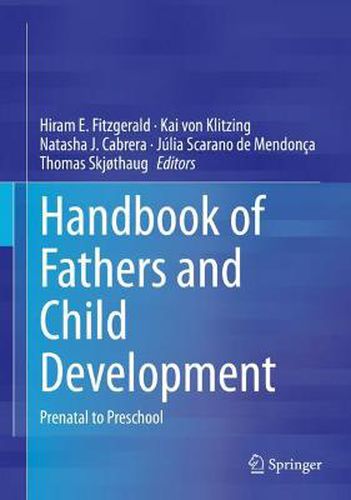Readings Newsletter
Become a Readings Member to make your shopping experience even easier.
Sign in or sign up for free!
You’re not far away from qualifying for FREE standard shipping within Australia
You’ve qualified for FREE standard shipping within Australia
The cart is loading…






This title is printed to order. This book may have been self-published. If so, we cannot guarantee the quality of the content. In the main most books will have gone through the editing process however some may not. We therefore suggest that you be aware of this before ordering this book. If in doubt check either the author or publisher’s details as we are unable to accept any returns unless they are faulty. Please contact us if you have any questions.
This handbook provides a comprehensive review of the impact of fathers on child development from prenatal years to age five. It examines the effects of the father-child relationship on the child’s neurobiological development; hormonal, emotional and behavioral regulatory systems; and on the systemic embodiment of experiences into the child’s mental models of self, others, and self-other relationships. The volume reflects two perspectives guiding research with fathers: Identifying positive and negative factors that influence early childhood development, specifying child outcomes, and emphasizing cultural diversity in father involvement; and examining multifaceted, specific approaches to guide father research.
Key topics addressed include:
Direct assessment of father parenting (rather than through maternal reports).
The effects of father presence (in contrast to father absence).
The full diversity of father involvement.
Father’s impact on gender role differentiation.
Father’s role in triadic interactions of family dynamics.
Father involvement in psychotherapeutic family interventions.
This handbook draws from converging perspectives about the role of fathers in very early child development, summarizes what is known, and, within each chapter, draws attention to the critical questions that need to be answered in coming decades.
The Handbook of Fathers and Child Development is a must-have resource for researchers, graduate students, and clinicians, therapists, and other professionals in infancy and early child development, social work, public health, developmental and clinical child psychology, pediatrics, family studies, neuroscience, juvenile justice, child and adolescent psychiatry, school and educational psychology, anthropology, sociology, and all interrelated disciplines.
$9.00 standard shipping within Australia
FREE standard shipping within Australia for orders over $100.00
Express & International shipping calculated at checkout
This title is printed to order. This book may have been self-published. If so, we cannot guarantee the quality of the content. In the main most books will have gone through the editing process however some may not. We therefore suggest that you be aware of this before ordering this book. If in doubt check either the author or publisher’s details as we are unable to accept any returns unless they are faulty. Please contact us if you have any questions.
This handbook provides a comprehensive review of the impact of fathers on child development from prenatal years to age five. It examines the effects of the father-child relationship on the child’s neurobiological development; hormonal, emotional and behavioral regulatory systems; and on the systemic embodiment of experiences into the child’s mental models of self, others, and self-other relationships. The volume reflects two perspectives guiding research with fathers: Identifying positive and negative factors that influence early childhood development, specifying child outcomes, and emphasizing cultural diversity in father involvement; and examining multifaceted, specific approaches to guide father research.
Key topics addressed include:
Direct assessment of father parenting (rather than through maternal reports).
The effects of father presence (in contrast to father absence).
The full diversity of father involvement.
Father’s impact on gender role differentiation.
Father’s role in triadic interactions of family dynamics.
Father involvement in psychotherapeutic family interventions.
This handbook draws from converging perspectives about the role of fathers in very early child development, summarizes what is known, and, within each chapter, draws attention to the critical questions that need to be answered in coming decades.
The Handbook of Fathers and Child Development is a must-have resource for researchers, graduate students, and clinicians, therapists, and other professionals in infancy and early child development, social work, public health, developmental and clinical child psychology, pediatrics, family studies, neuroscience, juvenile justice, child and adolescent psychiatry, school and educational psychology, anthropology, sociology, and all interrelated disciplines.